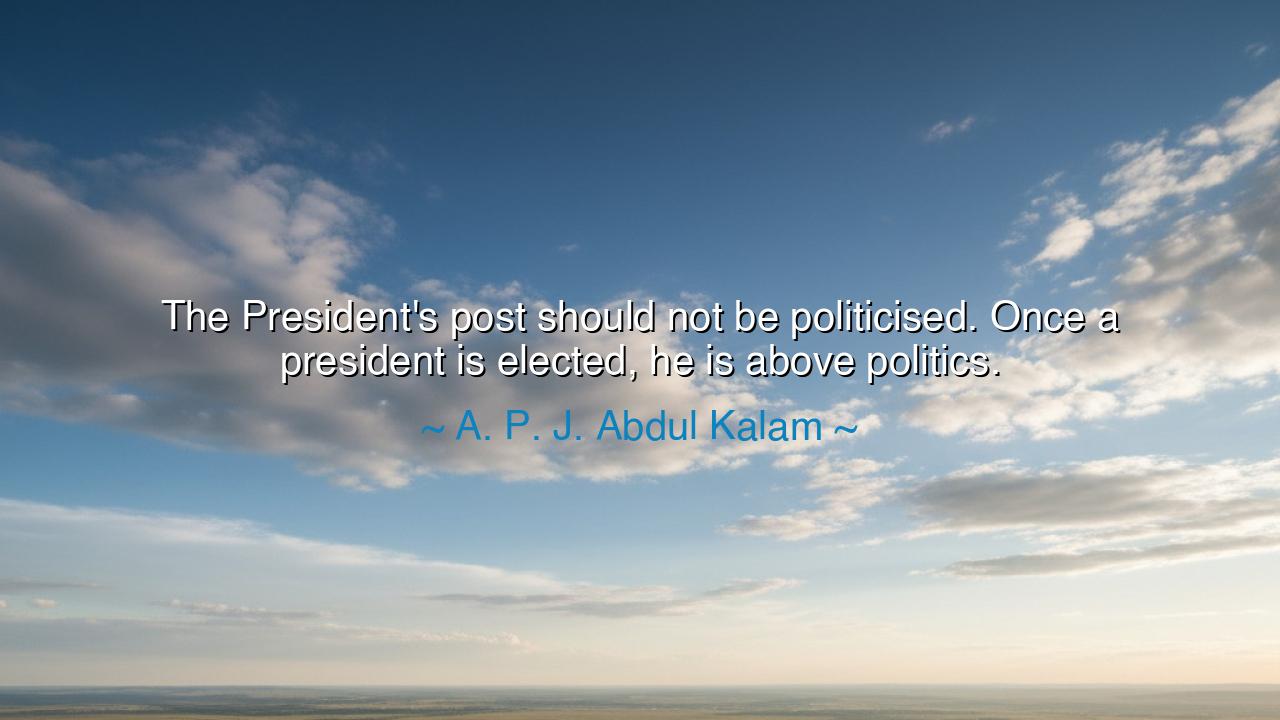
The President's post should not be politicised. Once a president
The President's post should not be politicised. Once a president is elected, he is above politics.






Hear the solemn words of A. P. J. Abdul Kalam, the beloved “People’s President” of India, who declared: “The President's post should not be politicised. Once a president is elected, he is above politics.” These words carry the dignity of a man who devoted his life to science, service, and the nation, a man who saw leadership not as a prize for ambition but as a sacred trust. His voice rises like that of an elder guardian, reminding us that while politics divides, the presidency must unite.
The origin of this truth lies in the vision of democracy itself. In many nations, the president is chosen through contests of politics—debates, campaigns, alliances, and rivalries. But once elected, the office must transcend those rivalries, for it no longer belongs to one party or one ideology. It belongs to the whole people. To cling to partisan struggle after assuming the mantle of head of state is to betray the sacred trust of the people. For the president is not a warrior of factions, but a symbol of the nation’s unity.
Consider, O listener, the example of George Washington, the first president of the United States. He could have become king, and many urged him to do so, but he refused. He served not as a partisan chieftain but as a father of the republic, stepping down after two terms to show that the presidency was not for personal glory but for service. Washington understood, as Kalam reminds us, that the president must be above politics, or else the office itself becomes corrupted and the nation weakened.
Abdul Kalam lived this truth. Though he was elected with the support of political parties, once he ascended to the presidency, he became a figure beyond division. He traveled the land, meeting children, teachers, farmers, and scientists, carrying the message of hope and progress to every corner. He did not speak as the voice of one faction, but as the voice of India itself. His presidency was proof that leadership can rise above rivalry, that the highest office can be a beacon of unity.
And yet, the temptation to politicise such a post is great. In times of conflict, parties seek to claim even the symbols of unity as their own. Leaders may forget that the president’s power is not to command armies of voters, but to embody the conscience of a nation. When this office becomes a weapon of politics, trust is broken, and the people no longer see their leader as guardian of all, but as servant of some.
The lesson for us is clear: leadership at its highest is not about winning arguments or vanquishing foes. It is about holding together the threads of a diverse people, so that the fabric of the nation does not tear. The president must be like the sun—shining upon all, warming the whole land, favoring no one corner above another. To politicise this role is to turn the sun into a torch that burns only for a few, leaving the rest in shadow.
And what actions must we take? As citizens, we must demand leaders who, once elevated to positions of unity, abandon the weapons of faction. We must resist the urge to see them only as champions of one party, and instead hold them accountable as servants of all. As individuals, in our own smaller spheres of leadership—be it family, community, or workplace—we too can learn to step beyond division, to rise above quarrels, and to act for the good of all, not just our own circle.
Thus remember the teaching of Abdul Kalam: “Once a president is elected, he is above politics.” This is not a denial of politics, but its fulfillment, for only when leaders rise above division can democracy bear its greatest fruit: unity, dignity, and peace for the whole people. Let future generations carry this wisdom as a shield, so that the offices entrusted to them may never be stained by partisanship, but shine as symbols of harmony.






BHNguyen hoai bao han
I appreciate Kalam’s call for a President to be above politics, but isn’t it a bit idealistic in practice? In a world where every decision made by the President is scrutinized through a political lens, is it even possible to avoid politicization? And if a President is expected to be above politics, what kind of support systems should be in place to ensure they remain neutral while still engaging with the practicalities of governance?
ULTu Uyen Le
Kalam’s assertion that the President should be above politics is admirable, but I find myself questioning whether it's realistic in today’s polarized political climate. Would a non-political president be able to effectively lead the country or simply remain a figurehead with no real influence? Does this ideal neutrality conflict with the expectation that the President should represent the values and interests of the political party that elected them?
KKieu
Kalam’s perspective on the President’s role is interesting, but I wonder how practical it is in a world where politics permeates every part of governance. How can someone, even if elected to be above politics, avoid being influenced by party pressures? Does the very nature of holding such a high office inevitably involve some level of political engagement, even if it's not overt? How can we achieve true neutrality in such a charged environment?
BTBao Tram
A. P. J. Abdul Kalam's view on the President’s role being above politics is thought-provoking. I agree that once elected, the President should act in the interest of all citizens, regardless of political affiliation. But can a President truly remain above politics, given the nature of political parties and elections? How can they effectively unite a politically divided nation while maintaining neutrality? Is it even possible in practice, or just an ideal?